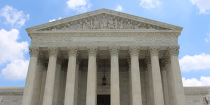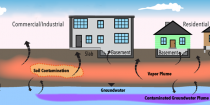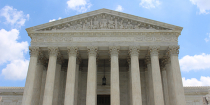Category: Environmental Litigation

It’s Raining Stormwater NOVs in California - 7 Tips For Responding To An IGP NOV
Responding to a California General Industrial Storm Water Permit (IGP) NOV can be a complex matter. Read the full article on Facility Executive for tips we’ve developed to facilitate success. Excerpt: After many years of drought, in late 2023 and early 2024 California experienced significant rain. Indeed, the National Oceanic...

What is Greenwashing?
In a recent webinar, "Greenwashing and its Dirty Consequences," I spoke about what greenwashing is, some examples, types of claims, and referencing the Federal Trade Commission's Green Guides for guidance. What is greenwashing? That is the question of the day. There is not one regulatory definition of what greenwashing...

Overview of Key 2021 Environmental Cases
Environmental Partner, Brian Moskal, recently presented at Greenberg Glusker's CLE Last Dash series discussing key 2021 environmental law cases. View the video below to learn about four key environmental cases under CERCLA, the Clean Air Act, and the Clean Water Act that impact various industries.

Offshore Drilling Project Dealt Setback by Ninth Circuit
Earlier this month, the Ninth Circuit dealt a setback to oil and gas interests, vacating the U.S. Department of the Interior’s Bureau of Ocean Energy Management (BOEM)’s approval of the “Liberty Project” – a offshore drilling and production facility located off the coast of Alaska in the Beaufort Sea...

Atlantic Richfield Co. v. Christian – Perpetuating the Cycle of Supreme Court Environmental Law Decisions that Spark Litigation and Confusion
The U.S. Supreme Court has a history of rendering muddled decisions when interpreting key environmental statutes, and with its decision in Atlantic Richfield Co. v. Christian et al., history repeats itself. Case Overview The underlying case has a long procedural and factual background, having ping-ponged up to the Montana...

SF Regional Board attempts to clarify vapor intrusion approach
The San Francisco Regional Water Quality Control Board recently issued a fact sheet summarizing changes to its approach to remediating environmental impacts and mitigating vapor intrusion (VI) at properties impacted with volatile organic compounds (VOCs). This follows a January 2019 update to the Board’s vapor intrusion environmental screening levels—which...

Superfund Case in the U.S. Supreme Court - Unintended Consequences?
In a recent interview with Ellen Gilmer at E&E News, I provided insights about a new case on the Supreme Court docket involving the Anaconda Smelter Stack and surrounding Superfund area in Montana. Overall, the article discussed the potential for unintended consequences if landowners in the long-running dispute over the Superfund...

California Supreme Court Finds that a Public Agency Cannot Inadvertently Waive Attorney-Client and Work Product Privileges
Last year, I wrote about the Second Appellate District case of Ardon v. City of Los Angeles . In Ardon , the appellate court found that a public agency can waive statutory privileges that it otherwise would have if it produces privileged documents in response to a California Public Records Act...
Can a Public Agency Inadvertently Waive Attorney-Client & Work Product Privileges? First and Second Appellate District Split on the Issue
In January, I wrote about the Second Appellate District case of Ardon v. City of Los Angeles . In Ardon , the court found that a public entity can waive statutory privileges that it otherwise would have if it produces privileged documents in response to a California Public Records Act (PRA...

Insurance Protection for Losses May Be Freely Assigned in Connection with a Corporate Sale or Reorganization
On August 20, 2015, the California Supreme Court handed down its much-anticipated decision in Fluor Corporation v. Superior Court (Hartford Accident & Indemnity Company) . The court held that Insurance Code §520, a seldom cited provision of the Insurance Code dating back to 1935, bars an insurer from refusing...

Public Entities Can Inadvertently Waive Privilege in Response to a Public Records Act Request
California’s Public Records Act (PRA) law requires public entities to make their public records open for inspection and copying. Environmental practitioners often use PRA requests as a tool to obtain information regarding a contaminated or a potentially contaminated site. In a recent case, Ardon v. City of Los Angeles...

CEQA Lead Agencies Do Not Waive Defense that CEQA Did Not Apply Despite Proceeding under CEQA
Recently, the court in Rominger v. County of Colusa found that a lead agency which approved a mitigated negative declaration for a project, can take the seemingly inconsistent position that the proposed project was not a California Environmental Quality Act (CEQA) project or was exempt from CEQA when its...
Substantive Dispute over Land Application of Biosolids Remains Unresolved
Form over substance continues to obscure the substantive issue presented in the case of the City of Los Angeles (City) vs.Kern County (County) . At its core, the dispute involves the land application of biosolids. Biosolids are organic material produced during the processing and treatment of wastewater. Historically, waste...
City’s Decision to Not Prepare an EIR Upheld Under Substantial Evidence Standard
Earlier this month, in Latinos Unidos De Napa v. City of Napa, the California Court of Appeals upheld the city of Napa’s determination that it did not have to prepare an environmental impact report (EIR) under the California Environmental Quality Act (CEQA) when enacting minor changes to its general plan and...
LITIGATION UPDATE: Writ of Certiorari filed in Solutia, Inc. v. McWane, Inc.
Recently, Solutia Inc. and Pharmacia Corporation filed a petition for writ of certiorari with the U.S. Supreme Court seeking to overturn the Eleventh Circuit’s ruling that a Potentially Responsible Party (“PRP”) conducting a cleanup pursuant to a consent decree is foreclosed from bringing a cost recovery action against other PRPs under...
LITIGATION UPDATE: CALIFORNIA SUPREME COURT GRANTS REVIEW OF L.A. LIGHT RAIL CASE
On August 8th, the California Supreme Court granted review of the Second District Court of Appeal’s decision in Neighbors for Smart Rail v. Exposition Metro Line Construction Authority. As previously blogged in April, the Second District found that a lead agency’s use of projected future conditions to measure the environmental impacts that a...
CVS Settles Hazardous Waste Suit
In a settlement reached in mid-April, CVS Pharmacy Inc. (CVS) agreed to pay almost $14 million to settle claims that it improperly stored and disposed of hazardous waste at its drugstores in California. In a suit brought in Ventura County Superior Court, prosecutors representing 45 cities and counties across...
Parties Can Toll CEQA Statute of Limitations
Last week, in Salmon Protection and Watershed Network v. County of Marin, the California Court of Appeals found that a public agency and a party disputing the adequacy of an environmental impact report (EIR) under the California Environmental Quality Act (CEQA) can enter into a tolling agreement to toll or suspend the...
Second Appellate District Approves Use of Projected Future Baseline to Measure Environmental Impacts in L.A. Light Rail Case
On Tuesday, the Second District Court of Appeal issued its decision in Neighbors for Smart Rail v. Exposition Metro Line Construction Authority , ruling that a lead agency’s use of projected future conditions to measure the environmental impacts that a long-term infrastructure project will have on traffic and air quality did...
Sackett v. EPA – Supreme Court Allows Pre-Enforcement Review of Clean Water Act Compliance Orders
On March 21st, the United States Supreme Court unanimously ruled that the Sackett family has a right to challenge a pre-enforcement compliance order from the Environmental Protection Agency (EPA) before EPA initiates a formal enforcement action in Sackett v. EPA. The Sacketts own about a half-acre vacant parcel of land in Idaho. In...
Supreme Court Settles Riverbed Battle
The Supreme Court recently issued its opinion in the closely watched case of PPL Montana, LLC v. State of Montana , 565 U.S. __ (2012), unanimously reversing and remanding a controversial Montana State Supreme Court decision granting Montana ownership of riverbeds underlying ten hydroelectric facilities on three of the...
Ninth Circuit Invalidates EPA’s Approval of Valley’s 2004 One-Hour Ozone SIP Based On Failure to Address “Stale” Emissions Data
Recently, Honorable Judge Ronald M. Gould, writing for a panel of the Ninth Circuit Court of Appeals, found the Environmental Protection Agency’s (“EPA”) 2010 approval of the San Joaquin Valley’s 2004 1-hour ozone National Ambient Air Quality Standard plan (“2004 SIP”) was arbitrary and capricious, citing EPA’s failure to adequately address the potential...
Sackett v. EPA – Supreme Court to Decide Whether Pre-Enforcement Review of Compliance Orders Allowed
On Monday, the United States Supreme Court heard oral argument on Sackett v. Environmental Protection Agency (docket no. 10-1062). At issue is whether a party who was issued a pre-enforcement compliance order from the Environmental Protection Agency (EPA) has the right to have the order judicially reviewed before EPA initiates an enforcement action...
Don’t Sink That Battle Ship: New Suit Demands Tighter Rules on Navy’s Disposal of Vessels at Sea
Environmental groups filed suit last week in California federal court against the United States Environmental Protection Agency (EPA) alleging the agency failed to adequately regulate a federal ship sinking program, which the groups assert pollutes the sea with toxic polychlorinated biphenyls (PCBs). The federal program, known as SINKEX, allows the Navy to engage...
LA + EPA + SMOG = LAWSUIT: Environmental Groups Sue EPA for Missing Smog-Related Deadline
On Monday, environmental groups, including Physicians for Social Responsibility-Los Angeles, Desert Citizens Against Pollution, Communities for a Better Environment and the Natural Resources Defense Council, filed a complaint for declaratory and injunctive relief against the Environmental Protection Agency (EPA). The suit alleges that EPA ran afoul of the Clean Air Act (CAA) by missing a May deadline...
Cleaning Up: Resolving Your Environmental Liabilities with other People’s Money
David E. Cranston, chair of the Environmental Law Group, was published in Smart Business Magazine regarding how clients can avoid being stuck with cleanup costs in environmental contamination cases. A client of ours faced significant costs in cleaning up property contaminated by the operations of its tenants many years...
No Backwards CEQA: California Appeals Court Finds CEQA Review Required for Effects of the Environment on a Project
The California Court of Appeal in Orange County found late last week that agencies are not required under the California Environmental Quality Act (CEQA) to evaluate the potential impact that the present environment would have on a proposed project. If you just read that and rubbed your eyes that is because it seems...
No [Global] Warming Up To A Nuisance: Supreme Court Finds Clean Air Act Preempts Federal Climate Change Nuisance Claim
On Monday, the highest court in the land held in American Electric Power Co., Inc. v. Connecticut that federal common law nuisance claims relating to climate change are displaced (or “preempted” for you traditionalists out there) by the Clean Air Act (CAA) and Environmental Protection Agency (EPA) action authorized by the CAA. The case began in 2004...
No Second Guessing EPA: CERCLA Citizen Suit Cannot Interfere With Ongoing Cleanup
This week, the Ninth Circuit ruled that the Comprehensive Environmental Response, Compensation, and Liability Act (CERCLA) does not give a federal district court jurisdiction to adjudicate claims for past noncompliance with an order issued by the Environmental Protection Agency (EPA). The decision, Pakootas v. Teck Cominco Metals, Ltd., affirms that CERCLA’s citizen suit provision...
Another Rule Bites The Dust: The Ninth Circuit Abandons the “Federal Defendant” Rule in NEPA Cases
Thanks to the Ninth Circuit Court of Appeals, gone are the days when private parties and state and local governments were prohibited from intervening on the liability or merit stage of claims brought under the National Environmental Policy Act of 1969 (“NEPA”). CEQA GavelNEPA, much like it’s California equivalent...
- Page 1 of 2
- Next

